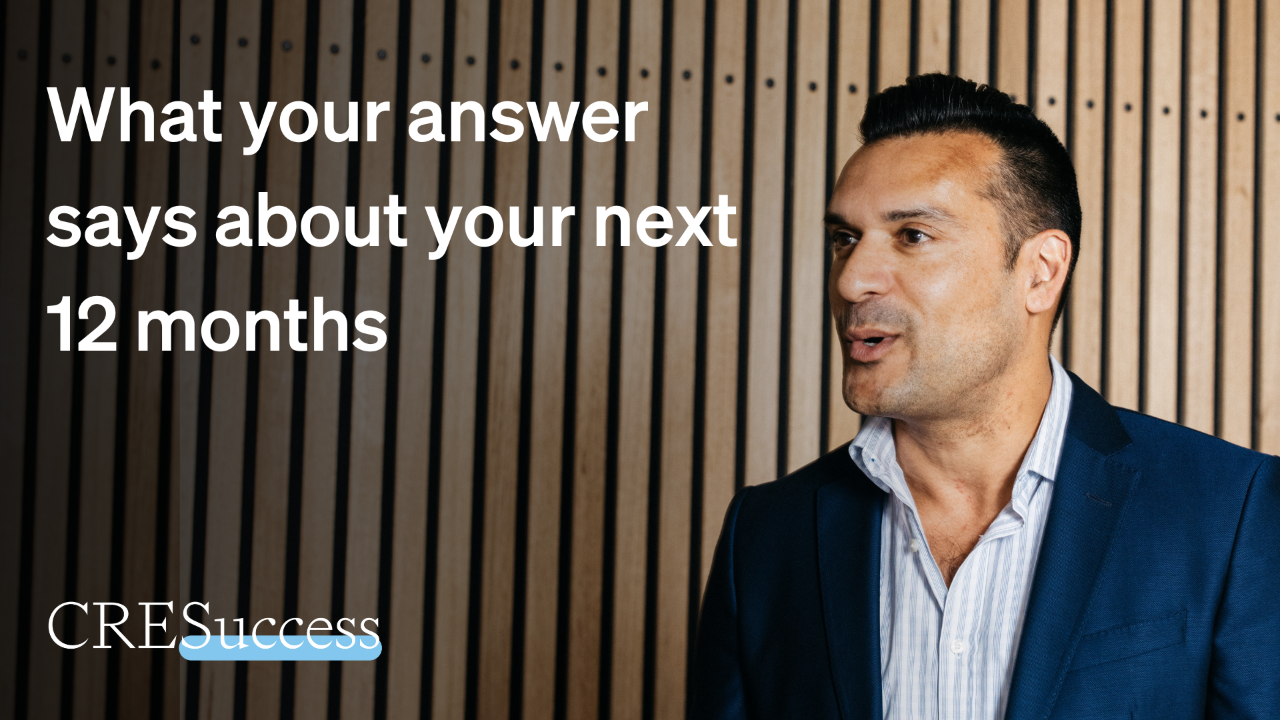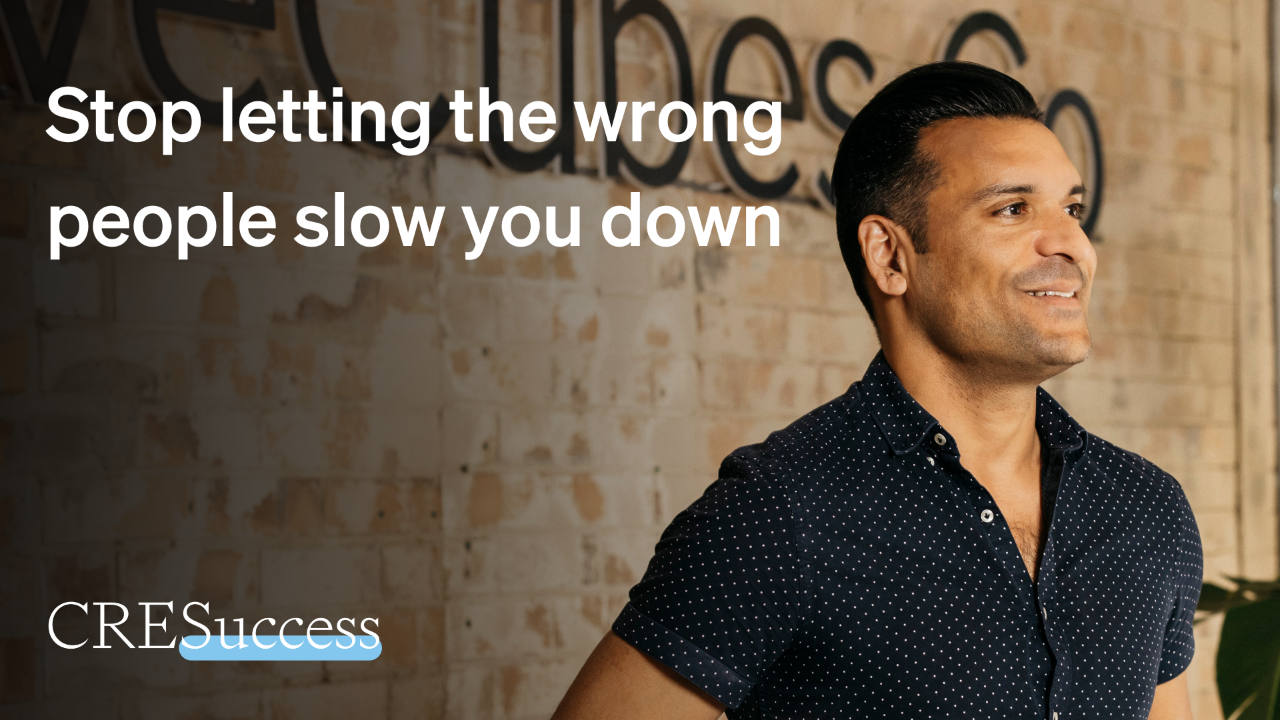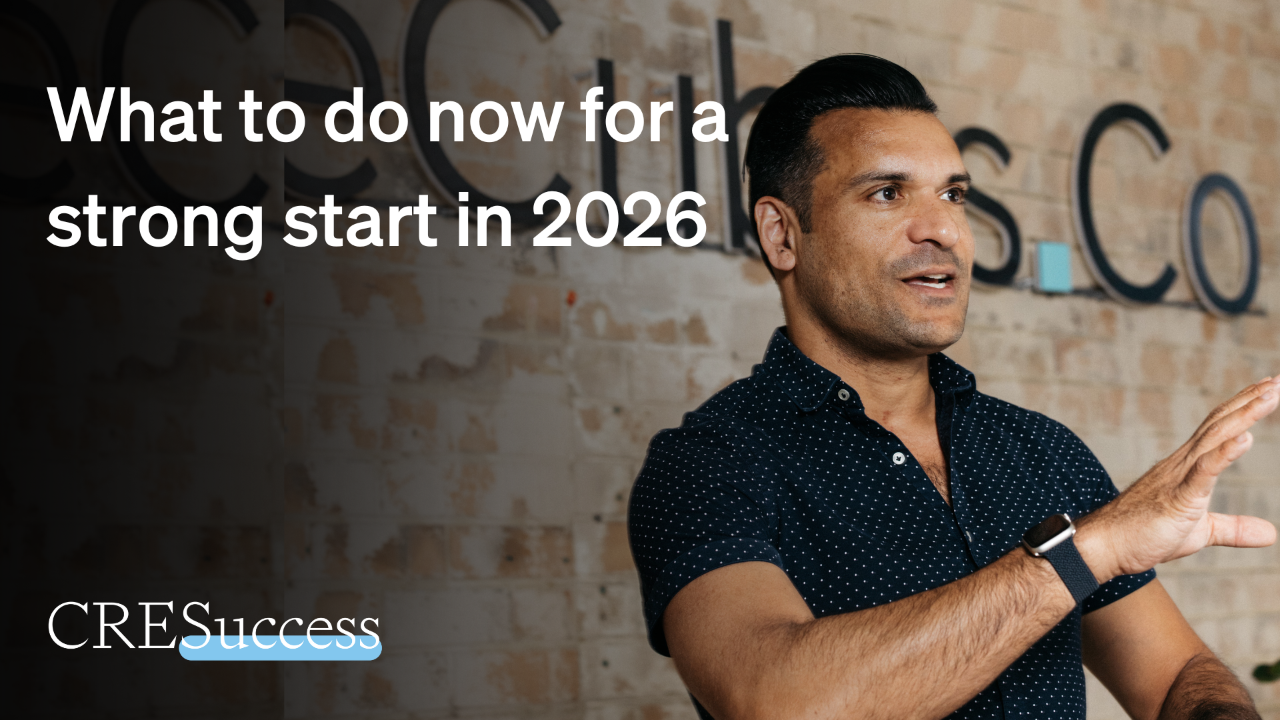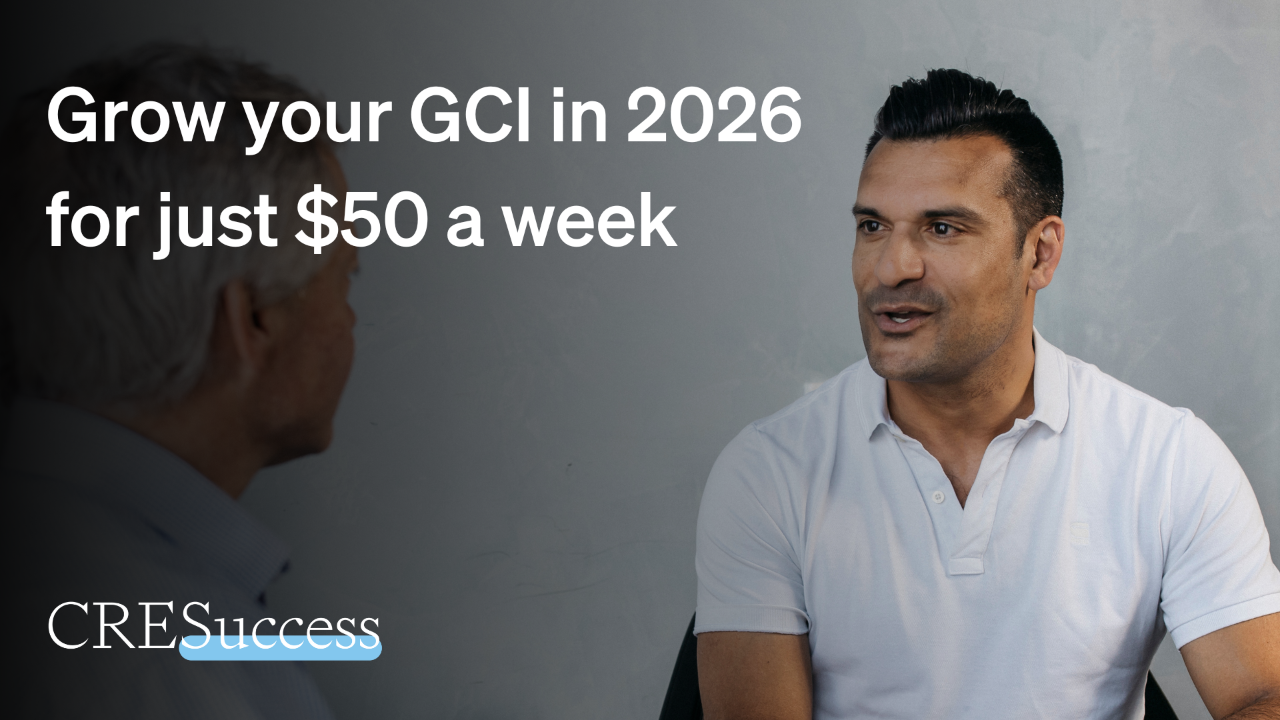Learning from the mistakes of others is a great strategy
Mar 22, 2023
Last week I didn’t share any video from my interview with Chris Stewart of LJ Hooker Commercial on the blog.
It wasn’t because I forgot to share the link or because it was bad content – in fact, it contains one of the nicest testimonials I’ve ever received.
The reason I didn’t share the YouTube clip was because I failed to download the video within 30 days of recording it.
It meant that it was no longer in the cloud by the time I went to access it (fortunately, I managed to salvage the audio from a different app).
Given this was quite a rookie error, I got to thinking about some other tech-related blunders I’ve made over my commercial real estate career.
As a result, I’m going through the embarrassment of sharing eight of the dumbest mistakes I’ve made using technology.
Since learning from the misfortune of others is a better strategy than experiencing it yourself, it’s time for you to read, watch or listen to episode 132 of CRE Success: The Podcast.
Episode transcript:
On today's episode of the show, I'm going to be explaining why last week's episode of the show didn't have any video.
So, if you do catch the show on YouTube, you might be wondering, “Why was it just audio?”
It's because I made a dumb mistake.
And today I'm going to be telling you the eight dumbest mistakes that I've made with technology and how you can avoid them. So, stick around.
Hello, welcome to Episode 132 of CRE Success: The Podcast. My name is Darren Krakowiak. I really, really appreciate you being there.
If it's your first time joining us, thank you so much for finding this content and deciding to listen or watch today's episode.
And if you're returning, we always appreciate you giving us your attention. We really value it. Thank you so much for being there.
I work with commercial real estate leaders; I help them with things like developing their people and also growing their business.
If you do enjoy today's episode, I humbly request that you recommend this content to somebody you know. More people in commercial real estate, I think need this sort of content to help them with their own personal and professional development.
If you can help them find it, I'm sure that at least one person will appreciate it. So let someone else that you know, know about CRE Success: The Podcast.
Now before we get into the eight dumbest mistakes I've made in technology, I do want to share with you an important workshop that we've got coming up.
It's called 'How to build a prospecting pipeline.' You can attend for free by going to cresuccess.co/pipeline.
I'll tell you more about that at the end of today's show. But if you're ready, if it sounds good, if you need to get more prospects into your pipeline so you can accelerate your deal flow, then go to cresuccess.co/pipeline now and reserve your spot.
All right, so let's talk about the eight dumbest mistakes I've made with technology and how you can avoid them.
Well, the first one is not actually capturing the video, when you get one of your best clients to come and do a testimonial interview with you, which happened to me last week.
Now, I actually recorded the video and it was captured. But then, what I didn't do was go into zoom and download the video within one month.
So, in the first week, it stays on the main part of zoom. And then zoom actually keeps it for you for up to 30 days.
But because I recorded the interview back in January, and we didn't actually release it until last week (we were currently in March 2023), I just didn't get around to downloading that content.
Usually, I would remember as soon as the interview is finished to download the content and store it where I store all of my podcast content, but I didn't.
So that meant that I made a stupid mistake.
Now. Luckily, I managed to salvage the audio through another app that I was using at the time.
But it did mean that I am not able to use any video content from that platform.
So, I guess, my first mistake for you to avoid is to make sure that you are recording.
And if you do record, make sure that you download that content from the cloud, if you are recording it to the cloud and not to your hard drive to make sure that you can actually use that valuable video or audio or whatever it is that you've recorded for when you intend to actually share it with others.
Number two on my mistakes is failing to backup important data.
So, back in 2016, I learned the hard way about how ransomware works because I was hacked on my personal computer and I got blackmailed for 1.2 bitcoins.
Now, back in 2016, I remember it was about $1000 roughly that they wanted from me and I just decided that I was going to let it go even though I lost so many of my own personal files and things that I've collected over the years.
What happens when you get held ransom is they encrypt all your files and they say if you send money to this account, we'll give you a code that will allow you to unlock all of those encrypted files.
I think what I done was I downloaded some content that was encrypted and then everything on my computer basically got frozen.
And at the time, I even had connected to my laptop, the backup hard drive that I was using to back up my data.
And what I learned from that was is that we need to back up our files and we need to use the cloud because when we're backed up on the cloud, the ransom where, as far as I know, can't get there, right?
Because that's sitting there, I use the Microsoft storage plan that's sitting there on the cloud, that's backed up.
They might be able to lock all the files that are on my hard drive or that are on my portable hard drive, external hard drive, but they can't actually get to the cloud.
So, number two is backing up your important data.
Number three is not using weak passwords or reusing passwords across multiple accounts.
So, I used to be a little bit slack, or, I guess, relaxed about this. And I used to give my passwords to my EA when I worked in corporate, and she did my banking and my airline stuff and all the rest of it.
And I never actually bothered to change the password that I was using for those accounts and for all my other accounts.
Now, if you've got somebody who's helping you with things like social media content posting, or even other things like your insurance or managing some of your banking, there are a few things that I would recommend that you do.
First of all, you can use social media scheduling software, so you don't need to share your password.
You would give your assistant a password, and he or she would log into that platform. And then from there, they can share to your social accounts without actually having to log into your social media accounts.
You can also use there's programs called LastPass, for example. These are password storage apps, where you put all your passwords into this app, and then there's one master password for you and for your assistant to be able to get in there and then to do what they need to do with those accounts.
So, you're not having to give pure access to somebody else.
Now, if you must share a password with somebody else, what I would recommend that you do is you create a new format for your passwords.
Like I've got a specific sequence of passwords that I like to use across a lot of things.
But if I'm going to share a password like for example, my LinkedIn account with somebody else, I would be creating a whole new password sequence for that.
So at least, they don't have access to everything else that I have. It's just to the one thing that I've given them.
Number four, is to not fall for other online scams, or the fake Tech Support Scam was it's kind of embarrassing.
So, I did this in the past as well. I got the phony email from it that they send around.
And if you actually click the button, then you have fallen for the pretend scam. And the punishment is that you have to complete a mandatory cybersecurity training session.
And that is a good little lesson because I'd rather I guess, be fooled by the pretend scam than the real scam.
So, the lesson is don't click suspicious looking emails and texts. Because the penalty could be a lot worse than just having to sit through a boring reeducation program from your IT department.
Number five is not using two-factor authentication.
So, look, I know it's a pain in the butt like opening up another device and then looking at Google. I use Google Authenticator to find the password that they're looking for as a second factor authentication.
But that is a lot better than trying to get your accounts back if you are hacked.
I keep hearing stories from a coaching program that I'm in of people getting their Facebook accounts hacked.
And these people use their Facebook accounts for their ads for their personal branding. And it's just a nightmare to try and get back.
Two-factor authentication makes it far less likely that your personal accounts can be hijacked.
So really worth using a lot of platforms now basically make it mandatory, but some, it's not mandatory, it's by choice.
If you have the choice to be able to use it, I would recommend that you do use it.
I haven't learned that one the hard way. But I have seen through other people's hardship that it is something worth doing.
Number six, have sort of silly mistakes is sharing sensitive information on social media.
So, one that I used to do, because I guess this is kind of like I used to be a little bit of a show off what it would be coming to you know, getting on the plane and I've been assigned seat one A.
I'm sitting at the front thinking, I'm the most important passenger on the plane, and I wonderful.
I couldn't help but take a photo of my boarding pass and share it on Instagram, back in the day.
And one time one of my friends texted me and he said, "What are you doing?"
I said, "What do you mean?" He goes, "You're not supposed to share your boarding pass on social media that's makes it very easy for someone to steal your identity."
And I didn't quite understand how they could get that just from my frequent flyer number that would be on the boarding pass.
But the broader point was is that we don't want to needlessly share identifying information about ourselves on social media.
But I think these things happen when you don't know the risks of these little mistakes. But also, when you're rushing when you're not taking your time.
And when you're managing your time better and focusing on the things that matter, not everything that you can be doing, I think you're less likely to make these kinds of little mistakes.
In terms of what I mentioned at the start of the show, about our prospecting workshop, if you're not remaining consistent with your prospecting, I know there are many things that come up and many reasons and many excuses for not prospecting, I get it, you're busy.
But the thing I want to get across to you is that if you don't have a system for your prospecting, then you're making it harder for yourself to be consistent at it.
And when you have a system, it's easier to do, which makes it more likely to get done.
So, if you want to be more consistent with your prospecting, I think you should join us for our special workshop on how to build a prospecting pipeline.
It's just a one-hour session. And it's going to help you create an effective outbound prospecting plan that will get your pipeline full of new opportunities.
And during this workshop, we're actually going to work together to reengage with existing clients, we're going to warm up style contacts, and we're going to connect with completely new or cold prospects and you're going to walk away with a solid system that's going to motivate you to recharge your prospecting efforts.
So, if you are ready to level up your prospecting, please join us. It's completely free. And you can reserve your spot by visiting cresuccess.co/pipeline.
That's our episode for today. Thank you so much for listening, and I will speak to you soon.
That was many, many years ago, I think nowadays, we need to be more vigilant about what we're sharing on social media to ensure that we're not inviting people to use that data or use information that we're sharing, to basically steal from us.
Number seven is leaving devices unattended and unlocked.
So, I record my podcast episodes now from the home office.
Last year, I had an office in a co-working space, which was my own enclosed office this year.
I've got the home office, but I've also got a desk in a co-working space, which is kind of like my second space to go to if something noisy is going on, at home.
But I haven't quite gotten into my mind that I need to be locking my PC every time I get up, and whether it's go to the bathroom, or to have a chat with somebody or whatever it is.
And I think this is also relevant for making sure that you log out of free Wi Fi networks.
So, I've noticed sometimes if I go past somewhere, my phone will be trying to get into some other Wi Fi network, because I haven't forgotten that network.
And these are a little tricks and tips that can help make your devices more secure.
So, make sure that you are logging out of your laptop when it's in a public place that you're logging out of accounts when you're using public computers and PCs, and that you're logging out of free Wi Fi networks.
And my last tip for you, number eight, is under the heading of miscellaneous email mistakes. And there are so many that we could talk about here like sending an email to the wrong person.
So, you see someone that you're referencing in the email, and then you might even be saying something a little bit naughty about them, and then you end up sending them the email.
I've done that once. But it wasn't like, terrible what I was referring to, but I was referring to that really well.
Another one is sending an email to the wrong person, because they've got the same first name as the person who you're meant to be sending it to.
And then you could potentially be sending sensitive information to somebody from another company.
I've done that as well. But it wasn't too sensitive. So, I probably got away with it. And I just asked the person to delete the email.
And then I sent an email to the person who was supposed to receive and say, "I know the person I'm sorry." I've asked them to delete the email and wasn't anything too sensitive in it.
The other one is proofreading the whole email and then sending it but not actually proofreading the subject line, and proofreading the salutation or their name and then actually having spelt their name wrong.
So that's another one, miscellaneous email mistakes. There are many, many, many of them.
But I think these things happen when you don't know the risks of these little mistakes. But also when you're rushing when you're not taking your time.
And when you're managing your time better and focusing on the things that matter, not everything that you can be doing, I think you're less likely to make these kinds of little mistakes.
In terms of what I mentioned at the start of the show, about our prospecting workshop, if you're not remaining consistent with your prospecting, I know there are many things that come up and many reasons and many excuses for not prospecting, I get it, you're busy.
But the thing I want to get across to you is that if you don't have a system for your prospecting, then you're making it harder for yourself to be consistent at it.
And when you have a system, it's easier to do, which makes it more likely to get done.
So if you want to be more consistent with your prospecting, I think you should join us for our special workshop on how to build a prospecting pipeline.
It's just a one hour session. And it's going to help you create an effective outbound prospecting plan that will get your pipeline full of new opportunities.
And during this workshop, we're actually going to work together to reengage with existing clients, we're going to warm up style contacts, and we're going to connect with completely new or cold prospects and you're going to walk away with a solid system that's going to motivate you to recharge your prospecting efforts.
So if you are ready to level up your prospecting, please join us. It's completely free. And you can reserve your spot by visiting cresuccess.co/pipeline.
That's our episode for today. Thank you so much for listening, and I will speak to you soon.








